Search
Did you mean: The Dagda?
Search Results
![Offering to Inanna, Warka Vase [Top Register]](https://www.worldhistory.org/img/c/p/360x202/10591.jpg?v=1724658839-1724658887)
Image
Offering to Inanna, Warka Vase [Top Register]
The votive or sacred Warka Vase is decorated with three horizontal registers and shows signs of repair in antiquity. The top register depicts a complete scene. Here, a naked man offers a bowl of fruits and grains to a Mesopotamian female...
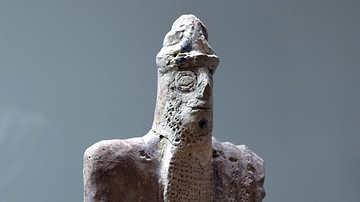
Image
Enlil
Baked clay statue of the Mesopotamian god Enlil, from the Scribal Quarter at Nippur, Iraq, 1800-1600 BCE.
Iraq Museum, Baghdad.
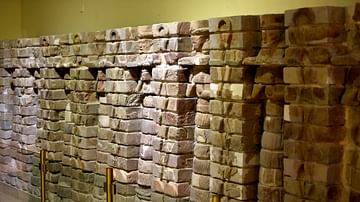
Image
Facade of Inanna Temple from Uruk at the Iraq Museum
This is part of the facade of the temple of goddess Inanna at Uruk (modern-day Warka, southern Iraq) and is made of bricks. There are standing male and female deities in alternating niches. Both hold a vase, pouring water in double streams...
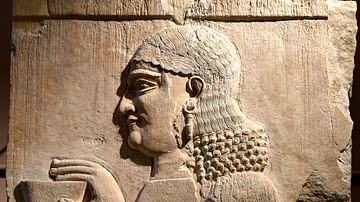
Image
Assyrian Eunuch from Khorsabad at the Iraq Museum
This image shows a detail of an almost-3-meter high alabaster bas-relief from the Palace of the Assyrian king Sargon II at Khorsabad (in modern-day Nineveh Governorate, Iraq). This is an Assyrian eunuch, holding a cup; its bottom is in the...
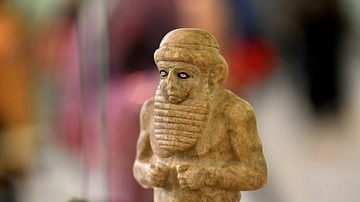
Image
Bust of a Priest from Uruk
Grey alabaster statue of a male priest, found inside a pottery vessel in the ancient city of Uruk by a German archaeological team from the German Oriental Society in 1929-1930. Probably, it was buried after it got broken. Its height is about...
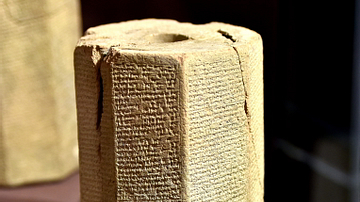
Image
Octagonal Prism of Sennacherib from Nineveh
The cuneiform inscription on this octagonal (8 facets) clay prism narrates the military campaigns of the Neo-Assyrian king Sennacherib (reigned 704 - 681 BCE). Neo-Assyrian period, early 7th century BCE. From Nineveh, in modern-day Ninawa...
![Throne Dais of Shalmaneser III [Front Panel]](https://www.worldhistory.org/img/c/p/360x202/10526.jpg?v=1733660592)
Image
Throne Dais of Shalmaneser III [Front Panel]
The front panel of this dais depicts Shalmaneser III (r. 858-824 BCE), (on the right) handshaking Marduk-zakir-shumi (r. 855 - 819 BCE) (left), king of Babylon. Both are surrounded by guards and stand below a fringed canopy supported by poles...
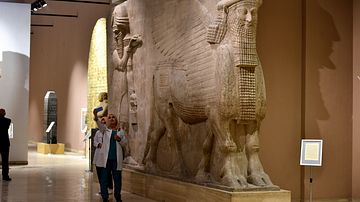
Image
Lamassu from Khrsabad at the Iraq Museum
This is one of a pair of colossal lamassus from the Palace of Sargon II at Khorsabad (in modern-day Nineveh Governorate, Iraq). Both of them are on display at the Assyrian Gallery of the Iraq Museum in Baghdad. During the ransacking of the...
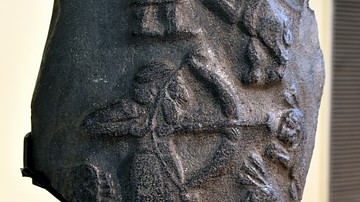
Image
Stele of Lion-Hunt from Uruk
Stele of a lion-hunt from Uruk, the oldest narrative Mesopotamian sculpture (in relief) and the first documented evidence of lion-hunting in Mesopotamia. It depicts two men hunting lions using a spear and arrows. One man is smaller than the...
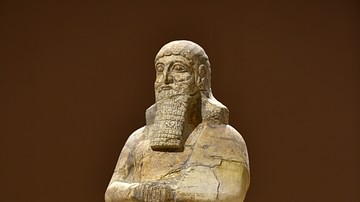
Image
Kurba'il Statue of Shalmaneser III
Kurba'il statue of Shalmaneser III (r. 858-824 BCE), found in Fort Shalmaneser in 1961 by the British School of Archaeology in Iraq. The statue originally stood in the Temple of Adad at the city of Kurba'il, north of modern-day Mosul...